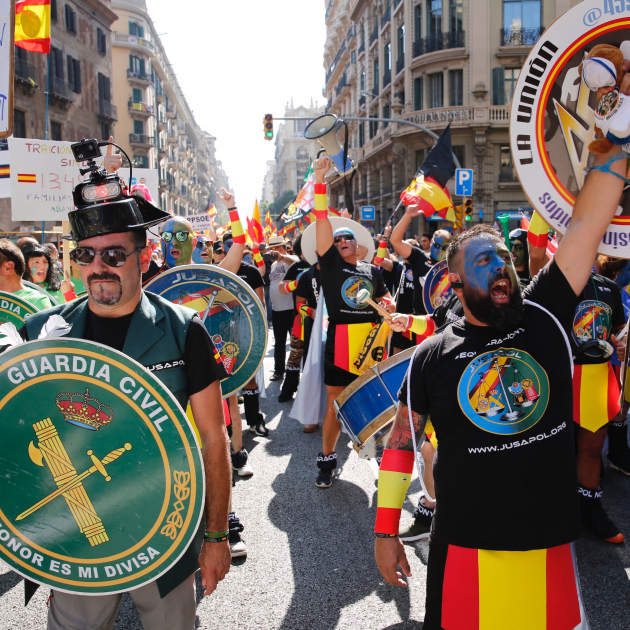The demonstration called by Spanish police union Jusapol in Barcelona has failed to attract more than 3,000 people - far short of the 10,000 expected - a number unable to even half-fill the central circle of the city's Plaça Catalunya. An event intended as a self-homage to the police officers who took part in the violent repression of last year's Catalan independence referendum on 1st October has thus fallen flat, compared with other rallies organised by police bodies around the Spanish state in pursuit of a rise in police pay.
Vía Laietana was the starting point for the march / Photo: Sergi Alcázar
Even though the protest was called for 12 noon, it was around 90 minutes earlier when dozens of people started congregating in front of the police station housing Spain's National Police force, on Via Laietana. The demonstration was announced as being based on a slogan that called for salary rises, but it was unmissable (being included in the small print of the protest flyers) that behind this pay claim was an attempt to show off the unity of Spain and give a homage to Spain's National Police and Civil Guard forces that carried out the severe police repression on 1st October last year. At the end of the rally, an act of recognition was held for these police officers.
Jusapol demonstrators listen to their union leaders' speeches / Photo: Sergi Alcázar
Jusapol failed in its efforts to bring police officers to the march from Valencia, Seville, Zaragoza and Zamora; the turn-out, which at first on Via Laietana seemed to have had some success - the marchers were spread out - revealed its true, minor scale on arrival in Plaça Catalunya.
Moments of tension on arrival at Plaça Catalunya
While a police cordon by the Catalan Mossos forces prevented a group of pro-independence demonstrators from accessing Via Laietana, another cordon, established by the protest organizers, stopped the unionist supporters from deviating from their route.
The Mossos d'Esquadra form a cordon to avoid confrontations / Photo: Sergi Alcázar
During the demonstration there were several moments of tension, especially in Carrer Fontanella, near Plaça Cataunya, where a small group of antifascists received the Spanish police marchers with chants of "They shall not pass" and "The streets will always be ours".
The Mossos attempt to avoid confrontation between the two protests/ Roberto Lázaro
The tension intensified on arrival at Plaça Catalunya, where the Mossos had greater difficulty in setting up a police barrier. Some of the unionists confronted the independence supporters calling them "Nazis" and making throat-cutting gestures towards them.
A unionist group confronts the antifascists /Photo: S.A
Once in Plaça Catalunya, where it had become evident that the demonstration had fallen flat, several Jusapol representatives rose to the stage set up for the occasion. They all congratulated the Catalan Mossos for the work that they had done -"they have followed their orders", speakers said- and, again, behind the wage claim, they gave their recognition of the police actions carried out on 1st October last year.
"In the face of blackmail and manipulation," said one speaker, "we are here to say that what has been said about what happened on 1st October is not true". "We complied with the Constitution and our actions were proportionate", was another phrase heard, along with "Thanks to our fellow officers who on 1st October defended democracy", "Thanks to the Catalans who gave us support when the PP government removed us from the hotels, hotels which are Spanish" and "Catalans need to know that they are not alone, that here they have the National Police and the Civil Guard to do what is necessary".
Members of Jusapol chanting for the unity of Spain / Photo: Sergi Alcázar
The event ended at around two in the afternoon, at which point all National Police and Civil Guard officers taking part received a bracelet bearing the slogan: "For the unity of Spain. Operation Copernicus" - this being the police name given to the anti-referendum operation. The bracelet also featured the Spanish and Catalan flags.
The Jusapol demonstration was supported by the Ciudadanos (Cs) party as well as extreme-right political group VOX. Cs deputy in Madrid, Miquel Gutiérrez, took part in the demonstration, as did the leader of VOX, Javier Ortega. Ortega declared his support for the police and also called for the Catalan Mossos to be made illegal. Another known face seen on the march was that of Maria de los Llanos de Luna, former Spanish government delegate to Catalonia under Mariano Rajoy's PP government.
The Catalan interior ministry had earlier required the police demonstration to change its planned starting point from Plaça Sant Jaume, in order to avoid incidents, given that a pro-independence rally had also been called. This change caused Jusapol to accuse the Catalan government of giving in to independence movement blackmail.
